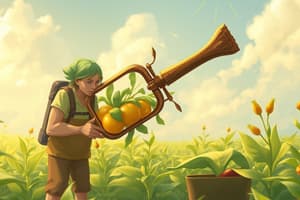Podcast
Questions and Answers
How do green plants synthesize their own food?
How do green plants synthesize their own food?
Through photosynthesis
Where do animals get their food from?
Where do animals get their food from?
- From soil
- From both plants and animals (correct)
- From plants
- From other animals
Food has to be produced on a small scale to feed a large population.
Food has to be produced on a small scale to feed a large population.
False (B)
What is agriculture?
What is agriculture?
Which of the following is a kharif crop?
Which of the following is a kharif crop?
What is the first step before growing a crop?
What is the first step before growing a crop?
Paddy requires a lot of water, therefore it can be grown in the winter season.
Paddy requires a lot of water, therefore it can be grown in the winter season.
Match the crop type with its corresponding season:
Match the crop type with its corresponding season:
What is manure?
What is manure?
Why do some plants grow better than others?
Why do some plants grow better than others?
What is the importance of good quality seeds?
What is the importance of good quality seeds?
Flashcards are hidden until you start studying
Study Notes
Importance of Food
- All living organisms require food for energy and fulfilling various body functions: digestion, respiration, excretion.
- Plants synthesize their own food through photosynthesis, while animals and humans depend on plants and other animals for nutrition.
Agricultural Needs
- Large-scale food production is essential to feed a growing population.
- Regular production, proper management, and effective distribution are critical for food supply.
Historical Context of Agriculture
- Nomadic lifestyle existed until around 10,000 B.C., with early humans foraging for raw foods and hunting.
- Transition to agriculture occurred with the cultivation of crops like rice and wheat.
Crop Definition
- A crop is defined as a large-scale cultivation of plants of the same kind in a specific area (e.g., wheat crop).
Crop Classification
- Types of Crops:
- Categorized into cereals, vegetables, and fruits.
- Seasonal Growth:
- Kharif Crops: Grown during rainy season (June to September); includes paddy, maize, soyabean, groundnut, cotton.
- Rabi Crops: Grown during winter season (October to March); includes wheat, gram, pea, mustard, linseed.
Basic Practices of Crop Production
- Soil Preparation: Necessary for crop growth; involves turning and loosening soil for root respiration and promoting beneficial organisms.
- Soil Composition: Contains minerals, water, air, and living organisms; decomposed matter enriches the soil with nutrients.
- Other Agricultural Practices:
- Sowing seeds
- Adding manure and fertilizers
- Irrigation management
- Weeding and crop protection
- Harvesting
- Storage of produce
Specific Crop Requirements
- Paddy requires abundant water, limiting its growth to the rainy season.
Sowing Seeds
- Seed drills are modern tools used for efficient sowing of seeds, ensuring uniform planting at appropriate depths and distances, thus minimizing damage from birds and saving labor.
Manure and Fertilizers
- Manure and fertilizers are essential for healthy plant growth, providing necessary nutrients to the soil.
- Continuous cropping depletes soil nutrients, making manuring essential to restore fertility.
Understanding Manure
- Manure is organic material derived from the decomposition of plant and animal waste.
- Farmers allow organic waste to decompose using microorganisms, producing organic manure beneficial for soil health.
Seed Selection
- Quality seeds are fundamental for successful crop production; selection involves choosing clean, healthy seeds known for high yield.
- A simple water test can distinguish good seeds from damaged ones; healthy seeds sink while damaged ones float.
Traditional and Modern Sowing Tools
- Traditional tools have been used historically for sowing seeds, while modern technologies like seed drills enhance efficiency and productivity in agriculture.
Studying That Suits You
Use AI to generate personalized quizzes and flashcards to suit your learning preferences.



